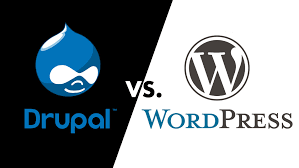Drupal vs. WordPress: Choosing the Right CMS for Your Website in 2024

Introduction
In the ever-evolving landscape of Content Management Systems (CMS), Drupal and WordPress remain at the forefront, empowering users to build robust websites and web applications. But with distinct strengths and weaknesses, selecting the ideal platform hinges on your specific needs and goals. Here's a comprehensive breakdown to guide your informed decision in 2024:

Ease of Use
WordPress: Reigns supreme in user-friendliness. Its intuitive interface and vast library of plugins make it a breeze to set up, manage content, and customize your website, even for beginners with limited technical expertise.
Drupal: While powerful, Drupal boasts a steeper learning curve. Its flexibility comes at the cost of a more complex initial setup process. However, its extensive documentation and supportive community can ease the learning journey.

Scalability
Drupal: Excels in scalability. Its modular architecture allows websites to grow seamlessly from simple blogs to complex enterprise-level applications. It effortlessly handles large amounts of content and high traffic volumes.
WordPress: While initially user-friendly, WordPress can encounter performance issues with large websites or significant traffic surges. Scalability improvements have been made in recent years, but it might require additional optimization for very demanding applications.

Security
Drupal: Renowned for its robust security features and focus on user access control. Drupal's core code is rigorously reviewed and updated frequently, making it a preferred choice for websites handling sensitive data.
WordPress: Due to its immense popularity, WordPress is a frequent target for hackers. However, regular plugin and core updates along with strong security practices can significantly mitigate these risks.

Customization
Drupal: Offers unparalleled customization capabilities. Its modular design allows developers to tailor every aspect of the website to meet specific needs. A vast array of contributed modules further extends functionality.
WordPress: Heavily relies on plugins to achieve customization. While a massive plugin ecosystem exists, extensive customization often requires a developer to create bespoke plugins.

Content Management
Drupal: Provides a powerful and flexible content management system. It excels at handling complex content structures, taxonomies, and workflows, making it ideal for websites with a large volume of diverse content.
WordPress: Well-suited for simpler content management needs. While offering basic content types and categories, it might struggle with highly structured or complex content management scenarios.

Cost
Drupal: Both platforms are open-source and free to use for the core software. However, Drupal development costs tend to be higher due to its complexity and potential need for custom development.
WordPress: Generally has lower development costs due to its ease of use and extensive plugin ecosystem. However, some premium plugins may require recurring fees.
Choosing the Right Platform
The optimal platform hinges on your specific requirements:
- For beginners or those prioritizing ease of use, WordPress is a clear winner.
- For websites demanding high scalability, robust security, and extensive customization, Drupal shines.
- For complex content management needs with a focus on structured data, Drupal excels.
In Conclusion
Both Drupal and WordPress are powerful CMS platforms, each catering to distinct needs. By carefully evaluating your website's requirements and your technical expertise, you can make an informed choice that empowers your online presence in 2024.